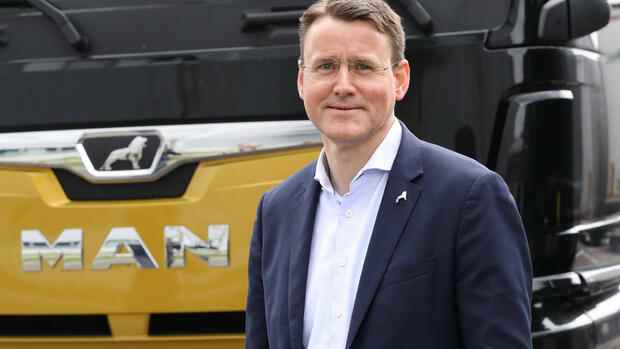Munich The truck manufacturer MAN is aligning its future with the electric truck. “From 2024 we are ready to go into larger quantities. We assume that in 2030 half of the trucks we sell will be running on electricity,” MAN boss Alexander Vlaskamp told the Handelsblatt.
At the IAA industry trade fair, which starts in Hanover on Monday, MAN is presenting its battery-powered electric truck, which is to be launched on the market with a range of 600 to 800 kilometers. MAN also relies on fast charging. “Our truck should be 80 percent charged in 45 minutes. This corresponds to the prescribed rest periods for drivers,” says Vlaskamp.
While MAN, which is in the process of restructuring, is fully committed to the battery when saying goodbye to the diesel engine, the competition is also planning to use hydrogen in combination with the fuel cell. Last year, for example, Daimler and Volvo Trucks founded a joint venture for fuel cell production with the aim of starting series production for trucks in 2025. With a view to the ramp-up of electric vehicles, “we will be happy about every truck that fills up with hydrogen,” said Daimler truck boss Martin Daum to the Handelsblatt.
MAN boss Vlaskamp is critical of the energy balance of green hydrogen produced, which is then converted in the fuel cell into electricity for vehicle propulsion. “To put it figuratively, you need the power of a wind turbine for an electrically powered truck. You need three wind turbines for a truck with a fuel cell.” The fuel cell will therefore remain a niche technology in trucks for a long time.
Top jobs of the day
Find the best jobs now and
be notified by email.
A truck fast charging network with 1000 kilowatts is required along the freeways
For more than a century, diesel was used in heavy goods traffic. Whether the heavy trucks will be powered by batteries or fuel cells in the future also depends on the infrastructure. MAN boss Vlaskamp is pushing for the expansion of a charging network for trucks only. But for this to happen, construction of the high-voltage lines must begin soon.”
For the time being, with the support of the Ministry of Transport, the A2 between Berlin and the Ruhr area is to be equipped with a high-performance charging network (Hola). In addition, the MAN parent company Traton, together with Daimler and Volvo, has announced that it will set up 1,700 stations across Europe on its own. However, the task is likely to be much greater: if the entire truck fleet in Europe were to be converted to electric drive, around 42,000 charging stations would be required, according to estimates by the industry association VDA.
One thing is certain: the entire truck industry has a duty to say goodbye to diesel in the long term. Although the EU has not imposed a ban on internal combustion engines as in cars, manufacturers must reduce average CO2 emissions by 15 percent by 2025, and 30 percent are under discussion for 2030. This is not possible without a battery or fuel cell. In addition, there is European emissions trading for the transport sector, which is expected to take effect from the middle of the decade and is likely to significantly increase the costs of operating diesel trucks.
Electric trucks, which are three times as expensive to buy today as a diesel truck, will then get a boost, believes Vlaskamp. “Depending on the general conditions, we assume that an electric truck will pay off compared to a diesel truck in terms of total operating costs from the middle of the decade.”
MAN was completely dependent on deliveries from Ukraine
For MAN, the powertrain turnaround is an additional challenge. In recent years, the Volkswagen subsidiary has repeatedly written losses despite a good order situation. While semiconductors were the main thing missing last year, it was wiring harnesses in the first half of 2022. When the war in Ukraine broke out, MAN obtained all of its cable harnesses from the Ukraine and was unable to produce due to the lack of deliveries. Now the assembly lines are running again and demand remains high.
>> Read here, how MAN and Scania deal with the problems in Russia.
“Our customers’ vehicles are well utilized and we have a high order backlog. We don’t currently see a recession in our industry,” said Vlaskamp. In fact, rising energy costs and the lack of drivers are an incentive for truck operators to switch vehicles. “Trucks in Europe are on average 13 years old. The majority of vehicles are no longer efficient, which is why our customers will invest.”
Vlaskamp now also has to continue the restructuring of MAN. Born in the Netherlands, he came to Munich in November 2021 and replaced VW manager Andreas Tostmann, who had to vacate his chair after a year and a flight affair. The former Scania manager needs a completely reorganized company for his electrical course.
This includes the reduction of over 3000 jobs in Germany and the sale of the Steyr plant with more than 2200 jobs in Austria, which should be completed next year. Heavy trucks will then only be built in the main plant in Munich and in Kraków, Poland. In addition to diesel drives, the engine plant in Nuremberg now also produces batteries.
The cooperation with the sister companies Scania and the US manufacturer Navistar, which Traton acquired in full last year, should also bring boost. The Traton Group also has a truck subsidiary in Brazil and a stake in the Chinese truck manufacturer Sinotruk. “We are still in the middle of restructuring. In the coming year we will have completed the most important steps. We continue to pursue the strategic goal of generating a return on sales of eight percent,” said Vlaskamp.
More: From workers’ fighter to integrator: How Bernd Osterloh brings VW’s truck brands together
